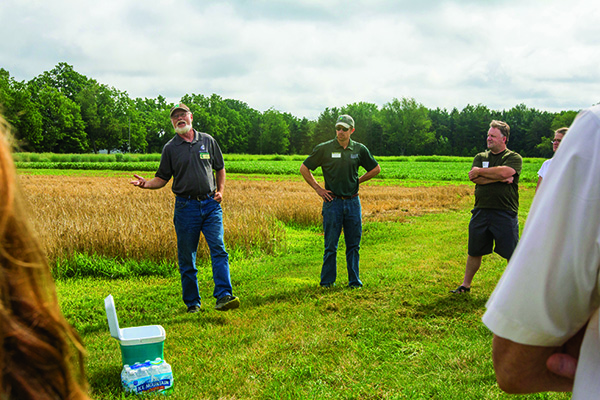Learn about Spartan Barley’s comeback at the W.K. Kellogg Biological Station
Most barley grown in Michigan has primarily originated from North Dakota and Central Canada, until now.

Hickory Corners, Mich. — West Michigan is decidedly beer territory – but most barley grown in Michigan has primarily originated from North Dakota and Central Canada, until now.
From a 5-gram sample in a seed bank, MSU professor Russ Freed and colleagues have been able to grow enough Spartan Barley to put it into production on a small scale to be used in brewing. With Dr. Dean Baas’ help, the first crop was planted and harvested at the Kellogg Farm at the W.K. Kellogg Biological Station in 2017.
Join us on Oct. 3 at KBS for our semiannual Dessert with Discussion event, which is free and open to the public, and will feature Drs. Freed and Baas. They will share how the 1916 variety of Spartan Barley was brought back to life, how barley fits into Michigan farming, and current research on growing winter and spring barley in Michigan.
Doors will open at 7 p.m., and Drs. Baas and Freed will speak from 7:30 – 8:30 p.m. in KBS’s Academic Auditorium, located at 3700 E. Gull Lake Dr. in Hickory Corners. Before the lecture, there will be delicious chef-crafted locally sourced desserts and a cash bar with Michigan craft beer and house wines. Visit the informational booths of our event partners and sponsors before and after the event.
- Michigan Brewers Guild
- Independent Barley and Malt
- Pierce Cedar Creek Institute
- Citizens Climate Lobby
- K. Kellogg Farm
- KBS Long Term Ecological Research (LTER)
- AmeriCorps

There is no admission fee; online registration is appreciated. To learn more, visit kbs.msu.edu, email communityrelations@kbs.msu.edu, or call 269-671-2015.
As MSU’s largest off-campus educational complex, we’ve put our land-grant values into practice for nearly a hundred years as we’ve delivered groundbreaking scientific research and education, community engagement, and historic preservation. As we look forward, our students, staff and faculty are working to understand and solve real-world environmental problems for a better tomorrow. KBS is more than any individual lab or location. There’s a story behind all that you see; look closer and you’ll find more amazing discoveries than ever before. To learn more about KBS, visit us online at kbs.msu.edu.
FOR MORE INFORMATION CONTACT
Blaire Bohlen, Communications Coordinator, W.K. Kellogg Biological Station
communityrelations@kbs.msu.edu
(269) 671-2015



 Print
Print Email
Email




